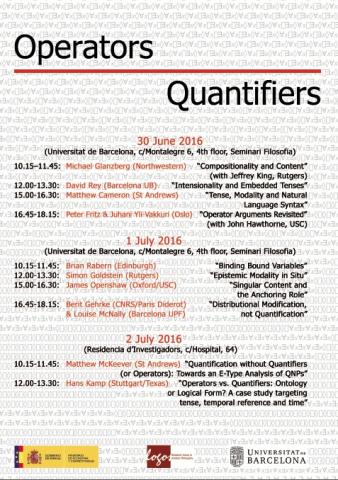
A semantic theory for a natural language provides a systematic description of (aspects of) the meanings of the repeatable expressions of the language. This description may serve a number of explanatory aims. For example, explaining how the meanings of complex expressions are determined by the meanings of their parts (compositionality) or explicating the notions of logical consequence, logical truth or synonymy. Another explanatory aim, which is relevant to this project, is to achieve an understanding of linguistic communication, specifically how the use of language can serve the purpose of transmitting information from one thinker to another.
Recent debates about semantic content have called into question traditional accounts and have renewed interest in unorthodox approaches, in particular approaches that operate with semantic contents that do not have absolute truth-values (de se contents, centered propositions, relativized propositions etc). These novel approaches to semantic content challenge the simple models of communication and information transfer that have traditionally been assumed. They also raise independently interesting questions about linguistic communication.
It is the aim of this project to clarify the role of semantic contents, as ascribed by a semantic theory, in an account of linguistic communication. In particular, the objectives of the project are (a) to achieve an up to date understanding of theories of the dynamics of conversation (e.g. theories of speech acts and conversational score/common ground), (b) achieve an up to date understanding of how belief states (incl. self-locating beliefs) are updated (both routine updating and updating under influx of new information), (c) to evaluate recent proposals and arguments concerning asserting, or communicating with, (allegedly) problematic centered contents, and finally (d) to develop accounts of the dynamics of conversation and of communication that can do justice to the (allegedly) problematic novel semantic contents.
More information at: https://semcon.wordpress.com/
Investigador Principal: Max Kölbel (Logos, ICREA at Universitat de Barcelona)
Johan Gebo (Logos, PhD-student (FPI) at Universitat de Barcelona)
Josep Maciá (Logos, Universitat de Barcelona)
Eduardo Martínez Zoroa (Logos, PhD-student (FI) at Universitat de Barcelona)
Andrei Moldovan (Universidad de Salamanca)
Daniel Morgan (Beatriu de Pinos Postdoc, Logos, Universitat de Barcelona)
Bryan Pickel (Formerly Logos, Universitat de Barcelona; now Edinburgh University)
Mihaela Popa (Beatriu de Pinos Postdoc, Logos, Universitat de Barcelona)
Giulia Pravato (Logos, PhD-student at Universitat de Barcelona & Ca’ Foscari Venezia)
David Rey (Logos, PhD-student (FPI) at Universitat de Barcelona)
Moritz Schulz (Formerly Logos, Universitat de Barcelona; now Hamburg University)
Isidora Stojanovic (Institut Jean Nicod, CNRS/ENS/EHESS, Paris)
Stephan Torre (Formerly Logos, Universitat de Barcelona; now University of Aberdeen)
Dan Zeman (University of the Basque Country)

